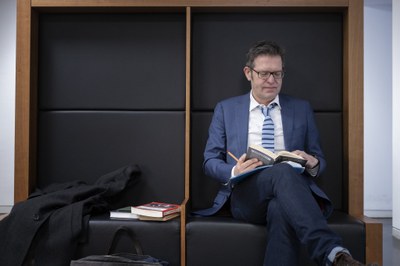“We live in a society with feudalistic traits”

Prof. Dr. Steffen Mau, Photo: Matthias Heyde
Mr Mau, the EU grants us enormous freedom of movement, and the term globalisation is on everyone’s lips. You, on the other hand, say that the borders are back again – albeit in a different form. What does that mean?
At first glance, borders seem to be more permeable than they used to be and, therefore, to be becoming a relic. Trade and production chains, such as financial flows, extend across the entire world. Likewise, information and cultural goods spread unhindered. People are also more mobile than ever before. Yet, under the conditions of globalisation, in particular, border regimes enforce territorial control and selectivity. They are powerful sorting machines. In today’s world, the question is not so much how old borders are opened or disappear, but how the border changes, and which sorting logics the new borders use.
What is taking root in place of barriers and passport controls?
The border in times of globalisation is different from that of the nation-state container and territorial model of national societies in the 20th century. States are increasingly joining forces in regional integration projects that also cooperate on this meta-level in various ways. In addition to the EU, these include NAFTA, Mercosur and ASEAN. We are dealing with various control locations, technologies and infrastructures. This ensemble can enable, channel or prevent mobility: we experience polarisation when it comes to the question of what level of freedom of movement is afforded to which people.
But the means by which the EU protects its external borders, for example, is a very controversial issue.
In this, we can see the dialectic of de-bordering and re-bordering in the context of globalisation. The EU has made its internal borders more and more permeable. At its external borders, on the other hand, such as in the Mediterranean, it has built up a rigid border regime based on isolation and seclusion. This year, over 1,000 people have already lost their lives there trying to get from Africa to Europe. Regional integration projects like the EU have created new areas of circulation – above the nation state but below the global level. They create openness in the internal relations between the members involved. In the relations with the outside world, however, they replicate or even increase the degree of closure. At the same time, we are also seeing a return of walled borders: in 1990, there were twelve fortified borders worldwide; today, there are over 70. At sealed borders, you can find huge camps in which people live under extremely precarious circumstances – for example, in Moria in Greece. The response to this, among other things, is increasingly to relocate controls away from the border. Border control is extraterritorialised.
How do you control a territorial border from a completely different location?
The EU, for example, has concluded agreements with countries in Africa in order to already intercept potential migrants there and choose who is allowed to enter and under what conditions. Anyone wishing to travel to the Western world from certain African, Arab or Asian countries will undergo detailed questioning beforehand. Entry is also denied to many out of fear of political terror or crime – this is especially the case with young men. As a rule, those affected do not find out the specific basis on which the decision was made. People from the Western world, on the other hand, have significantly greater freedom of movement. Furthermore, those who are willing to disclose extensive information about themselves in the run-up to their trip can save themselves time-consuming inconveniences at border crossings as certified “trusted travellers” and are waved straight through – in the fast lane, as it were.
So, is globalisation without borders just the privilege of a minority?
With only ten percent of the world’s population, Europe is responsible for more than half of all tourist trips worldwide; Africa is responsible for only three percent of these, with 17 percent of the world’s population. When it comes to air travel, this concentration on just a few is even more striking: the proportion of those who even fly at all within the space of a year is estimated to be three percent of the world’s population. Eighty to ninety percent of humans are believed to have never entered an aeroplane in their lives. Distribution data of this nature is an important indicator of the unequal levels of participation in opening and mobility processes. Viewed on global terms, we live in a society with feudalistic traits, where one’s place of birth determines how much freedom of movement one is afforded. This can also be seen from the super-rich, of whom around a third have a second citizenship. Two passports guarantee even greater freedom.
In addition to economic factors, what role does digitisation play?
We are on the way to smart borders. In future, a biometric scan could replace the passport. This makes a lot of things easier at first glance, but it also harbours dangers. What will countries like Russia or China do with our biometric data – will they perhaps create databases? In Western democracies too, the control needs of states can shift. Companies that specialise in digital border security and control are now also offering applications that could be used domestically with a view to the coronavirus pandemic. These could include, for example, access controls for public buildings that automatically recognise who has a digital vaccination certificate on their smartphone. Questions of data protection and data security will also take on greater importance in border management.
Interview: Lars Klaassen
Prof. Dr Steffen Mau works at the Department of Social Sciences at the Humboldt-Universität zu Berlin as head of the Macrosociology division. His book Sortiermaschinen. Die Neuerfindung der Grenze im 21. Jahrhundert (“Sorting Machines. Reinventing the Border in the 21st Century”) is available from 26th August from the publisher C.H. Beck: paperback with French flaps, 189 pages with five illustrations, € 14.95.
